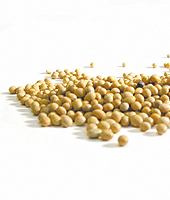Modern Soy Foods-Poison or Panacea?
A debate about the benefits of this popular bean A Health Pretender: The anti-soy argument In January 1976, Science Magazine published an interesting story about quail.

In January 1976, Science Magazine published an interesting story about quail.During dry years, the stunted plants upon which the quail normally feed before the mating season produce an estrogenic compound called genistein in their leaves. This substance causes infertility and prevents the production of young that would not have adequate food.
In wet years, forage grows vigorously and these phyto-estrogenic substances are largely absent. The quail breed prolifically and the abundant seed crop feeds the enlarged population.
Genistein is the major phytoestrogen in soy, currently promoted as a panacea for everything from hot flashes to cancer.
Those of us concerned about industry hype for a food that inhibits reproduction have documented more than 100 studies indicating that the benefits of isoflavones (phytoestrogens) are exaggerated and the dangers are very real.
Deleterious effects include endocrine disruption, lowered thyroid function, immune system suppression, lowered sperm production, digestive disorders, heart arrhythmias, DNA breakage, brain fog, memory loss and increased incidence of leukemia, breast cancer, colon cancer, infertility and growth problems. In animal studies, soy phytoestrogens cause "subtle changes in sexually dimorphic behaviours," meaning that males act more like females and females actmore like males.
But what about soy consumption in Asia? Don't the high levels of phytoestrogens in the Asian diet protect people from certain degenerative diseases, such as breast and prostate cancer, osteoporosis and heart disease? Actually, consumption of soy foods in China and Japan is relatively low, accounting for less than two per cent of calories and contributing between three to 28 milligrams of isoflavones per day. Daily amounts higher than this have been shown to cause problems. For example, 35 milligrams of isoflavones per day caused thyroid suppression in Japanese women receiving adequate iodine after just three months. In studies with American women, 45 mg per day caused hormonal disruption after just one month and changes presaging breast cancer after just 14 days. It is easy to ingest many times these amounts from modern soy foods. Soy milk, for example, contains 45 mg of isoflavones per cup and one highly advertised soy product contains 160 mg per serving. Babies on soy formula receive levels of isoflavones 0 to 20 times higher on a body weight basis than those found in traditional Asian diets, accounting for heartbreaking reports of girls who mature far too early and boys who do not mature at all.
In Asia, soy is generally consumed in small amounts as a fermented food. Fermentation neutralizes some of the problematic compounds found in all soybeans phytic acid that blocks mineral absorption and enzyme inhibitors that block protein digestion but does not get rid of the isoflavones. This is why Asians consume soy in small amounts and not as a substitute for
animal foods. Fermentation actually creates a number of beneficial compounds in soy, such as special fatty acids and vitamin K, which are otherwise low in Asian diets.
Always opportunistic, the food industry has figured out how to take the waste products of soy oil manufacture 80 percent of oil used in processed foods is soy oil-and turn the high-protein sludge into profitable imitation foods soy milk, soy cheese, soy yogurt, tofu cheesecake, veggie burgers, bac-o-bits and textured vegetable protein, all laced with imitation flavours and additives. A key strategy for promoting these foods includes the demonization of the real foods they are designed to replace milk products, eggs and meat.
Caveat emptor buyer beware. Huge financial interests are behind the push for soy, with billions to pay for advertising, university research, lobbyists and publicists. Do not believe their claims consumption of modern soy foods is very risky, and even traditional fermented soy foods should be included in the diet only with great care.




